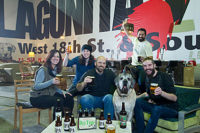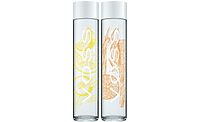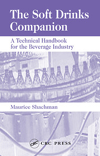The Lion Brewery: Pennsylvania Brewer Uses Diversity to Tap Potential
By DEIDRE SOKOL
The Lion Brewery has cause
to celebrate. The Wilkes-Barre, Pa.-based brewer turns 100 this year, and
while it prefers to keep its potables’ recipes under wraps, the
secret to its ongoing success is no mystery. Founded in 1905, the brewery
has survived both Prohibition and widespread industry consolidation, and is
one of the few remaining regional beer-makers left in the country,
producing about 400,000 barrels of product annually.
A business plan that relies on time-honored brewing
traditions along with product diversification, plus a growing
contract-packaging operation allows Lion to thrive in a business climate
dominated by mergers, acquisitions and fierce market competition.
“We have diversity, we’re flexible and
we’re able to produce a variety of different beverages, whether they
be our own beers, beers for other people, high-end soft drinks and kosher
and organic-certified beverages,” explains Chuck Lawson, Lion’s
president and chief executive officer.
While new products are a key ingredient in its
success, Lion’s premium beers also have potential for increased sales
and marketing opportunities. To celebrate the brewery’s 100th
anniversary, for example, brewmaster Leo Orlandini is working on a
limited-edition original recipe that will be on tap later this year. The
brew’s debut will coincide with a number of promotional anniversary
events also scheduled to kick off during the summer and run through the
rest of the year.
Recipe for success
Unlike large national brands, Lion’s beers are
brewed in smaller batches to ensure product quality and freshness. Smaller
runs, combined with original recipes deliver
the unique profile that Lawson and Orlandini describe as fuller-flavored
beers. “We do small pilot brews in the lab, taste it, run it through
the equipment to get all the parameters, see where it is and tweak it until
we get something the consumer will like and something we can repeat
consistently,” says Orlandini.
Lion’s beers are also brewed following the
Reinheitsgebot tradition, or German Purity Law of 1516, which states only
four ingredients — water, malt, yeast and hops — can be used to
make beer. Additives such as corn syrup, a popular ingredient in other
brands, are strictly prohibited. The Bavarian Duke, Wilhelm IV
instituted the law at the Ingolstadt Parliament in 1516 to ensure the
integrity of beers made during his reign. At the time, fruit, herbs, weeds
such as anis, myrtle, oak leaves, ivy, along with the poisonous seeds of
herbstzeitlosen, raspberries, elderberry, caraway were used as substitutes
for hops for their intoxicating effect or natural properties that extended
shelf life. Brewers today who follow the tradition do it voluntary in order
to claim a higher brewing standard.
Brewmaster Orlandini uses imported malts from Belgium, the United Kingdom and Germany. Compared to
American malts, European malts can cost $0.40 to $0.50 a pound, but Lion
believes they produce superior quality. Lion
has racked up a number of medals both nationally and internationally at the
Great American Beer Festival and the World Beer Championships in recent
years.
Lion’s beer portfolio is made up of its flagship
Stegmaier brand, which includes Stegmaier Gold Medal, Stegmaier 1857
American Lager, Stegmaier Porter; Lionshead and Lionshead Malt Liquor. In
May 2002, Lion’s brewers expanded its selection and introduced the
Pocono line. Each beer — Light, Pale Ale, Black and Tan, Caramel
Porter and Summer Wheat — is brewed under the same German Purity Law
guidelines.
Expanding to new categories
After delivering successful beer brands to market,
Lion capitalized on its name and success with a new line of bottled
flavored malt beverages and soft drinks.
Lion’s Long Island Iced Tea is an original blend
of Long Island Iced Tea flavor with a hint of lemon. Other flavors include
Lion’s Cosmo, Lion’s Kamikaze and Lion’s Happy Hour. The
brewery also produces high-end soft drinks, including Lion Brewery Root
Beer, and the Olde Philadelphia Soda line.
Lion seized another opportunity when it was given the
green light to bottle natural soft drinks for Steaz Green Tea Soda and the
Napa Valley Soda Co. “It’s an area of the marketplace
that’s growing and we think it’s going to continue to,”
explains Lawson.
“Certified organic” means that a
non-profit, state or private certification organization, accredited by the
United States Department of Agriculture, has verified that products labeled
as organic meet strictly defined organic standards. An organic plant such
as Lion’s is managed in accordance with the Organic Foods Production
Act and the National Organic Program to meet site-specific conditions that
integrate cultural, biological and mechanical practices that promote
ecological balance and conserve biodiversity.
“We make sure we follow the letter of the
law,” says Orlandini. “There are a lot of operational things
you cannot do. It’s a pretty intensive process.”
Even though organic certification adds extra layers of
compliance — cleaning protocols, storage regulations, book-keeping
procedures — the value added in terms of product diversification
outweighs the downsides of retooling its operations. After all, it’s
the flexibility to take on new challenges such as organic certification
that has kept Lion Brewery going for 100 years, and will drive it into its
next century. BI




